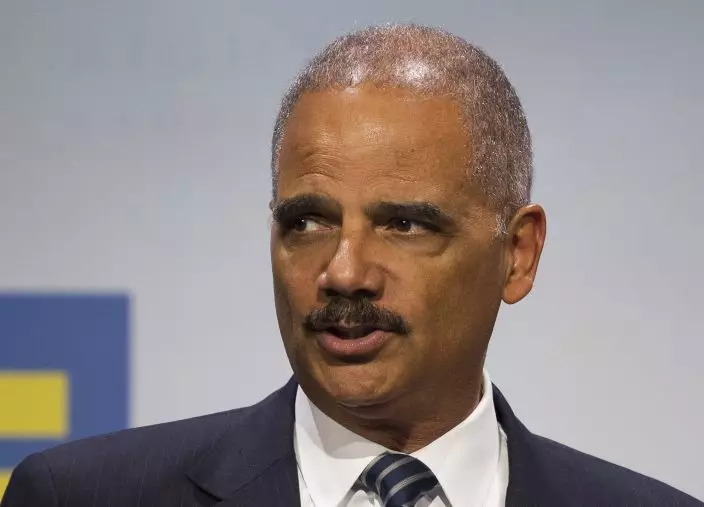Virginians will elect members of the House of Delegates this year using a map seen as favorable to Democrats, according to a ruling Monday by the U.S. Supreme Court.
The political boundaries are important because Republicans currently control the House with a 51-49 majority. Only four states are having legislative elections this year. Virginia is the only one where Democrats have a chance of flipping control of the House and Senate.
The high court's 5-4 decision was perhaps telegraphed by the fact that the justices previously allowed election planning to go forward with the new map. Virginia held its primary last week, and the November general election will be the last time the state uses this map because legislative districts will need to be redrawn to account for results from the 2020 census.

FILE - In a Wednesday, Jan. 23, 2019 file photo, Virginia House Speaker, Del. Kirk Cox, R-Colonial Heights, presides over the House during the session at the Capitol in Richmond, Va. Virginians will elect members of the House of Delegates this year using a map seen as favorable to Democrats, under a ruling Monday by the U.S. Supreme Court. (AP PhotoSteve Helber, File)
The justices let stand a lower court decision putting the new map in place, saying the Republican-controlled state House did not have a right to represent the state's interests in an appeal to the Supreme Court. The state could have decided to bring the case but did not, Justice Ruth Bader Ginsburg wrote.
"One House of its bicameral legislature cannot alone continue the litigation against the will of its partners in the legislative process," she wrote. The four justices joining her were Clarence Thomas, Sonia Sotomayor, Elena Kagan and Neil Gorsuch, a lineup that included conservatives and liberals. Dissenting were Chief Justice John Roberts and justices Samuel Alito, Stephen Breyer and Brett Kavanaugh.
The case stemmed from a map drawn by Republican lawmakers in 2011, after the last census, and used in the four elections since. Democratic voters sued in 2014, accusing Republicans of packing black voters into certain districts to make surrounding ones whiter and more Republican.

FILE - In this Sept. 15, 2018 file photo, former Attorney General Eric Holder addresses the Human Rights Campaign National Dinner in Washington, D.C. Virginians will elect members of the House of Delegates this year using a map seen as favorable to Democrats, according to a ruling Monday, June 17, 2019 by the U.S. Supreme Court. The lawsuit challenging the original House lines was backed by the National Democratic Redistricting Committee, led by former U.S. Attorney General Eric Holder. (AP PhotoCliff Owen, File)
A lower court ruled 2-1 last year that the previous map drawn by lawmakers improperly factored race into drawing 11 of the 100 House districts. After lawmakers failed to reach an agreement on a redistricting plan, the lower court chose a new map from a series of proposals submitted by a special master.
Virginia Attorney General Mark Herring, a Democrat, called the ruling a "big win for democracy in Virginia."
"It's unfortunate that House Republicans wasted millions of taxpayer dollars and months of litigation in a futile effort to protect racially gerrymandered districts," he said in a statement.
The lawsuit challenging the original House lines was backed by the National Democratic Redistricting Committee, led by former U.S. Attorney General Eric Holder. The group targets elections for governors and state legislators, court cases or ballot initiative to give Democrats more control during the next round of congressional redistricting after the 2020 Census.
"With a new, fair map in place, all Virginians will now — finally — have the opportunity this fall to elect a House of Delegates that actually represents the will of the people," Holder said in a statement.
House Republicans said they are disappointed by the ruling and criticized the "shadowy organization funded by out-of-state interests" that funded the lawsuit. But Republicans said they still expect to maintain their majority based on their track record of "common sense" leadership.
"Today's ruling from SCOTUS will make victory in November even sweeter," the House GOP caucus tweeted, adding in a statement: "We are confident that voters will opt for the leadership and results we have delivered over chaos, embarrassment, and unchecked Democratic control of state government."
The case is Virginia House of Delegates v. Bethune-Hill, 18-281.
Associated Press writer Alan Suderman contributed from Richmond, Virginia.
Follow Jessica Gresko on Twitter at http://twitter.com/jessicagresko
UNITED NATIONS (AP) — Russia on Wednesday vetoed a U.N. resolution sponsored by the United States and Japan calling on all nations to prevent a dangerous nuclear arms race in outer space, calling it “a dirty spectacle” that cherry picks weapons of mass destruction from all other weapons that should also be banned.
The vote in the 15-member Security Council was 13 in favor, Russia opposed and China abstaining.
The resolution would have called on all countries not to develop or deploy nuclear arms or other weapons of mass destruction in space, as banned under a 1967 international treaty that included the U.S. and Russia, and to agree to the need to verify compliance.
U.S. Ambassador Linda Thomas-Greenfield said after the vote that Russian President Vladimir Putin has said Moscow has no intention of deploying nuclear weapons in space.
“Today’s veto begs the question: Why? Why, if you are following the rules, would you not support a resolution that reaffirms them? What could you possibly be hiding,” she asked. “It’s baffling. And it’s a shame.”
Russia’s U.N. Ambassador Vassily Nebenzia dismissed the resolution as “absolutely absurd and politicized,” and said it didn’t go far enough in banning all types of weapons in space.
Russia and China proposed an amendment to the U.S.-Japan draft that would call on all countries, especially those with major space capabilities, “to prevent for all time the placement of weapons in outer space, and the threat of use of force in outer spaces.”
The vote was 7 countries in favor, 7 against, and one abstention and the amendment was defeated because it failed to get the minimum 9 “yes” votes required for adoption.
The U.S. opposed the amendment, and after the vote Nebenzia addressed the U.S. ambassador saying: “We want a ban on the placement of weapons of any kind in outer space, not just WMDs (weapons of mass destruction). But you don’t want that. And let me ask you that very same question. Why?”
He said much of the U.S. and Japan’s actions become clear “if we recall that the U.S. and their allies announced some time ago plans to place weapons … in outer space.”
Nebenzia accused the U.S. of blocking a Russian-Chinese proposal since 2008 for a treaty against putting weapons in outer space.
Thomas-Greenfield accused Russia of undermining global treaties to prevent the spread of nuclear weapons, irresponsibly invoking “dangerous nuclear rhetoric,” walking away from several of its arms control obligations, and refusing to engage “in substantive discussions around arms control or risk reduction.”
She called Wednesday’s vote “a real missed opportunity to rebuild much-needed trust in existing arms control obligations.”
Thomas-Greenfield’s announcement of the resolution on March 18 followed White House confirmation in February that Russia has obtained a “troubling” anti-satellite weapon capability, although such a weapon is not operational yet.
Putin declared later that Moscow has no intention of deploying nuclear weapons in space, claiming that the country has only developed space capabilities similar to those of the U.S.
Thomas-Greenfield said before the vote that the world is just beginning to understand “the catastrophic ramifications of a nuclear explosion in space.”
It could destroy “thousands of satellites operated by countries and companies around the world — and wipe out the vital communications, scientific, meteorological, agricultural, commercial, and national security services we all depend on,” she said.
The defeated draft resolution said “the prevention of an arms race in outer space would avert a grave danger for international peace and security.” It would have urged all countries carrying out activities in exploring and using outer space to comply with international law and the U.N. Charter.
The draft would have affirmed that countries that ratified the 1967 Outer Space Treaty must comply with their obligations not to put in orbit around the Earth “any objects” with weapons of mass destruction, or install them “on celestial bodies, or station such weapons in outer space.”
The treaty, ratified by some 114 countries, including the U.S. and Russia, prohibits the deployment of “nuclear weapons or any other kinds of weapons of mass destruction” in orbit or the stationing of “weapons in outer space in any other manner.”
The draft resolution emphasized “the necessity of further measures, including political commitments and legally binding instruments, with appropriate and effective provisions for verification, to prevent an arms race in outer space in all its aspects.”
It reiterated that the U.N. Conference on Disarmament, based in Geneva, has the primary responsibility to negotiate agreements on preventing an arms race in outer space.
The 65-nation body has achieved few results and has largely devolved into a venue for countries to voice criticism of others’ weapons programs or defend their own. The draft resolution would have urged the conference “to adopt and implement a balanced and comprehensive program of work.”
At the March council meeting where the U.S.-Japan initiative was launched, U.N. Secretary-General António Guterres warned that “geopolitical tensions and mistrust have escalated the risk of nuclear warfare to its highest point in decades.”
He said the movie “Oppenheimer” about Robert Oppenheimer, who directed the U.S. project during World War II that developed the atomic bomb, “brought the harsh reality of nuclear doomsday to vivid life for millions around the world.”
“Humanity cannot survive a sequel to Oppenheimer,” the U.N. chief said.

United States Ambassador and Representative to the United Nations Linda Thomas-Greenfield addresses members of the U.N. Security Council before voting during a meeting on Non-proliferation of nuclear weapons, Wednesday, April 24, 2024 at United Nations headquarters. (AP Photo/Eduardo Munoz Alvarez)

FILE - U.S. Ambassador to United Nations Linda Thomas-Greenfield speaks on Thursday, April 18, 2024, in Tokyo. The U.N. Security Council is set to vote Wednesday, April 24, 2024, on a resolution announced by Thomas-Greenfield, calling on all nations to prevent a dangerous nuclear arms race in outer space. It is likely to be vetoed by Russia. (AP Photo/Eugene Hoshiko, Pool, File)













